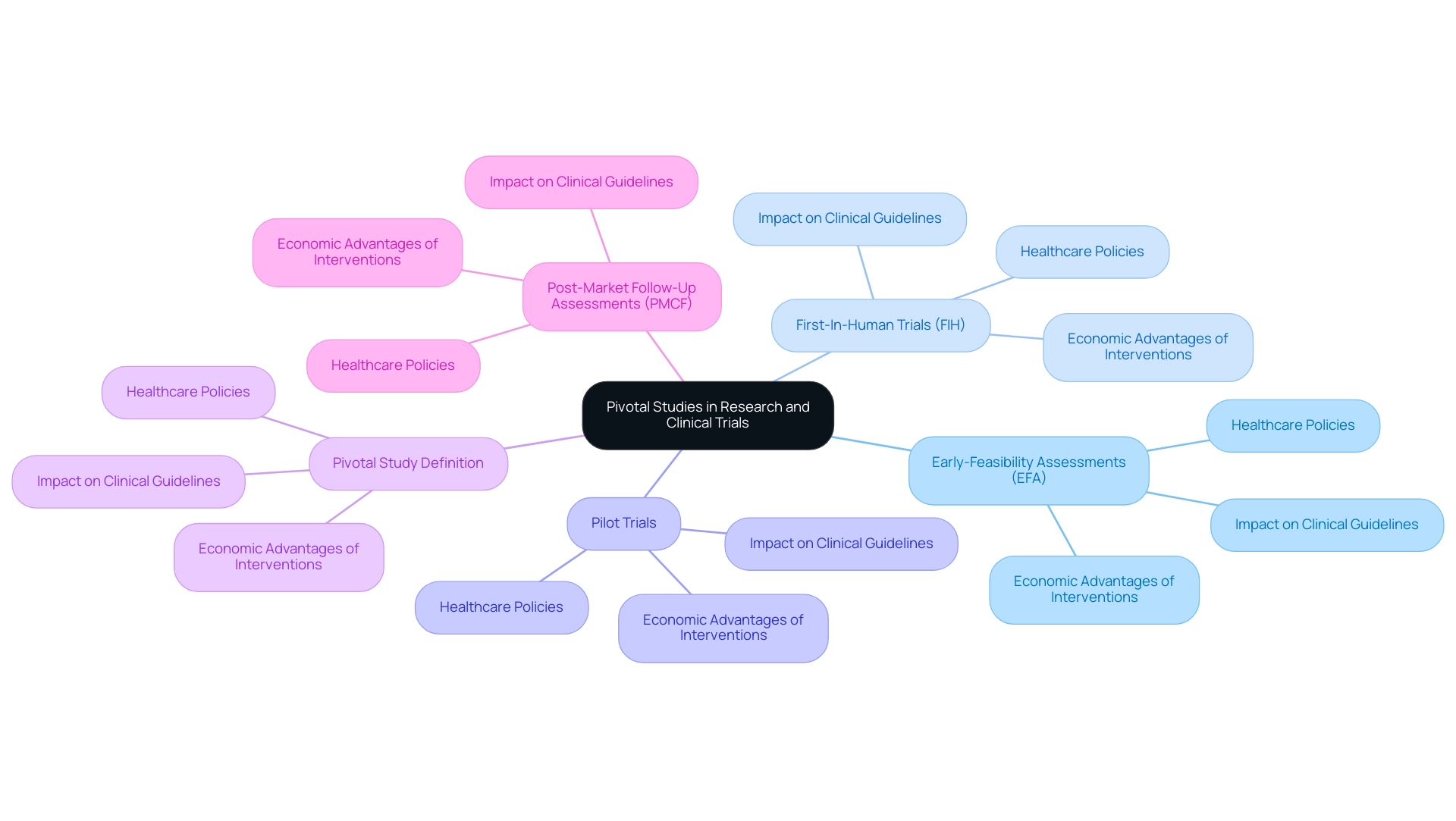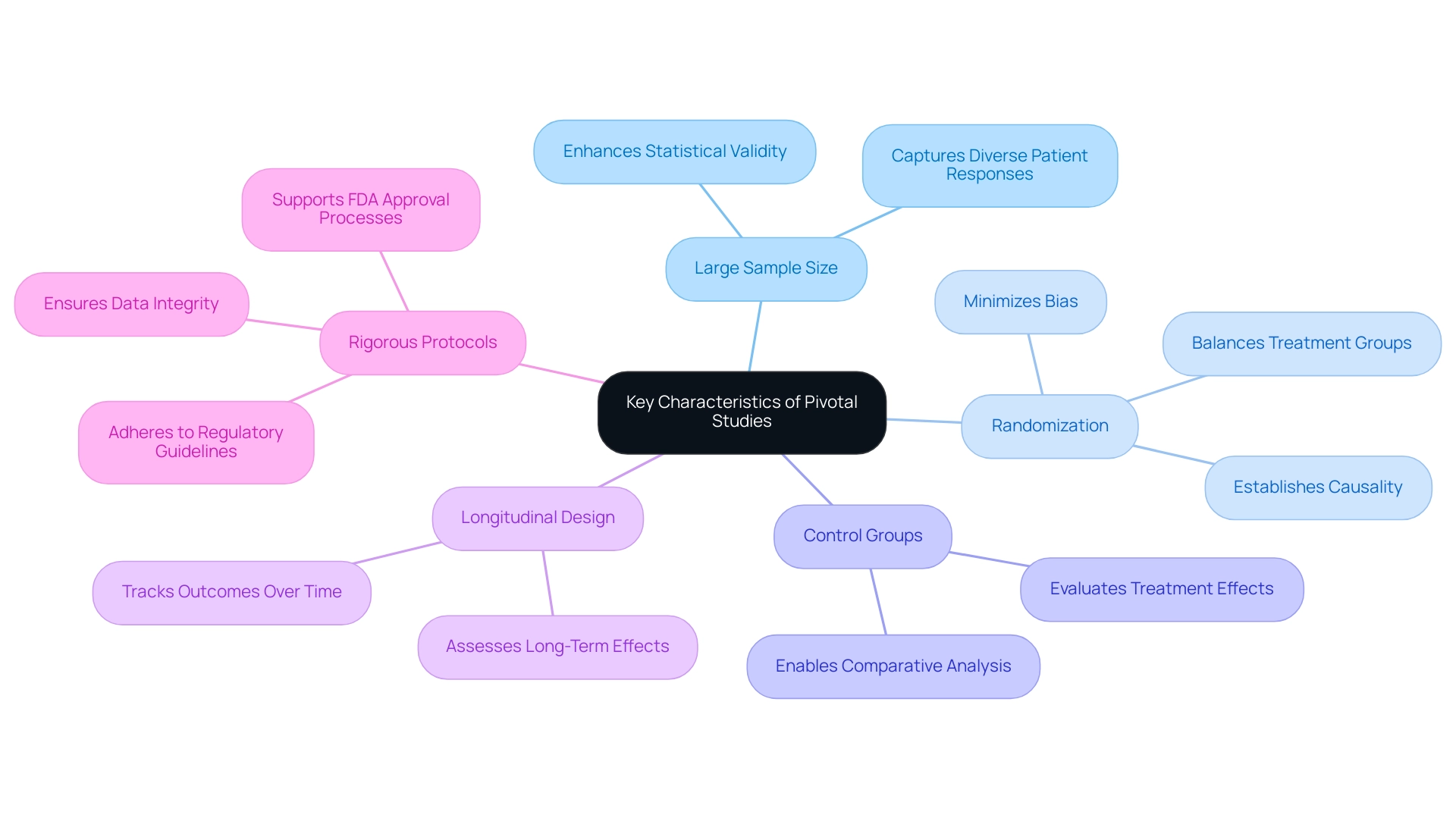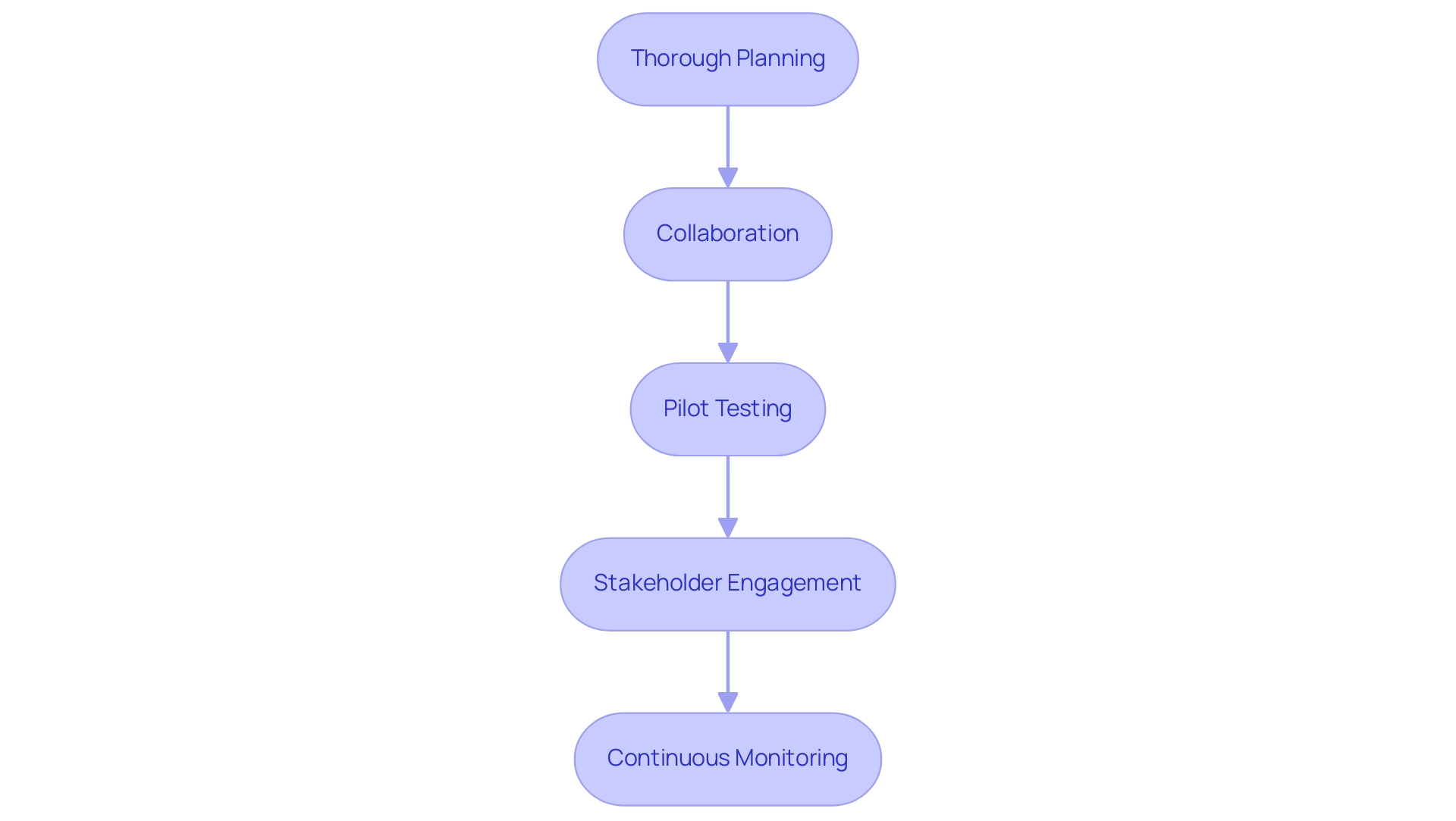Introduction
Pivotal studies play a crucial role in the landscape of clinical research, serving as the backbone for regulatory approval of new medical treatments and interventions. These meticulously designed trials are essential for generating the robust evidence needed to assess the safety and efficacy of emerging therapies, directly influencing clinical guidelines and healthcare policies.
As the field of medical research evolves, understanding the intricacies of pivotal studies becomes increasingly important for researchers and stakeholders alike. This article delves into the defining characteristics, challenges, and best practices associated with pivotal studies, highlighting their significance in advancing medical knowledge and improving patient care.
By exploring these elements, the article aims to provide valuable insights for those involved in clinical trial management, ultimately enhancing the quality and impact of research efforts in the Medtech industry.
Defining Pivotal Studies: A Comprehensive Overview
An essential research project represents a pivotal study definition, which is a crucial category of clinical trial specifically crafted to produce strong evidence concerning the effectiveness and safety of a treatment, intervention, or device. These analyses are essential in the drug approval process, as they provide the critical data required by regulatory bodies to make informed decisions about product approval for public use. Carried out with larger sample sizes and rigorous protocols, essential research ensures that results are dependable and relevant across various populations.
As a result, they significantly contribute to the sponsors' ability to substantiate their claims with credible data. Organizations like bioaccess® specialize in managing crucial research alongside other clinical trials, such as:
- Early-Feasibility
- First-In-Human
- Pilot
- Post-Market Follow-Up Research
Leveraging over 20 years of expertise in Medtech to ensure successful outcomes. Furthermore, optimizing operational efficiency in carrying out these analyses is crucial; minimizing the number of vendors and utilizing cost-effective web-based systems can enhance the overall process.
By comprehensively understanding crucial research, particularly the pivotal study definition, researchers can align their objectives with regulatory expectations, thereby enhancing the overall quality and impact of their research efforts. A pertinent case analysis titled 'ReGelTec Successfully Treats First Eleven Chronic Low Back Pain Patients with HYDRAFIL™ in Colombia' exemplifies how Early Feasibility Studies are conducted. This research, which involved remote proctoring via Zoom, demonstrated the effectiveness of HYDRAFIL™ in treating degenerative disc disease, showcasing the innovative approach bioaccess® utilizes in experiments.
Furthermore, a pertinent analysis named 'Interpretation of Trial Results' assessed how published evaluations correspond with FDA reviews, indicating that 93% of interpretations were consistent with FDA assessments, highlighting the significance of these investigations in regulatory contexts. Recent discoveries suggest that 77% of favorable experiments were published, further emphasizing the role essential research plays in advancing medical knowledge. As mentioned by Patricio Ledesma, Head of Clinical Operations and Founder at Sofpromed CRO, effective management of studies is crucial in navigating the complexities of drug development and regulatory approval, highlighting the necessity for expert guidance in optimizing these processes.
The adaptability and expert understanding necessary for medical device research are essential for guaranteeing that evaluations are carried out effectively and efficiently.
The Importance of Pivotal Studies in Research and Clinical Trials
Crucial investigations are essential to medical research, acting as the foundation for regulatory endorsement of new therapies and interventions. These investigations are part of a wider range of extensive trial management services, including:
- Early-Feasibility Assessments (EFA)
- First-In-Human Trials (FIH)
- Pilot Trials
- The pivotal study definition
- Post-Market Follow-Up Assessments (PMCF)
All expertly overseen by bioaccess®, which boasts over 20 years of experience in the Medtech sector. The results of crucial research exert considerable impact on clinical guidelines, healthcare policies, and patient care practices.
By rigorously evaluating the safety and effectiveness of a product, essential research provides stakeholders—including healthcare providers, patients, and policymakers—with the information needed for making informed choices regarding the adoption of new therapies. Considering the growing popularity of medical tourism as a way to lower healthcare expenses, especially for individuals in the US, essential research becomes increasingly important in showcasing the economic advantages of interventions. For instance, recent cost-effectiveness analyses suggest that universal BRCA testing and the transition to newer HPV vaccines are not only viable but can also yield substantial savings in healthcare costs.
This trend underscores the importance of health economics research in prevention, particularly as providers look to improve recruitment and retention by transforming care models and redesigning jobs. Furthermore, the findings from research that aligns with the pivotal study definition can illuminate pathways for subsequent research efforts, ensuring that future investigations are grounded in a robust evidence base. Recognizing the importance of these investigations enables researchers to create influential experiments that significantly aid progress in the medical sector, while also promoting job creation and economic development in local communities.

Key Characteristics of Pivotal Studies
Crucial investigations possess several defining characteristics that align with the pivotal study definition, distinguishing them from other clinical trials and ensuring robust outcomes while meeting regulatory requirements. These characteristics include:
-
Large Sample Size: Crucial research is designed with a substantial number of participants, enhancing the statistical validity and generalizability of the results.
A larger sample size increases the likelihood of capturing diverse patient responses, which is crucial for assessing treatment efficacy.
-
Randomization: A characteristic of essential research is the use of randomization. This methodology minimizes bias and ensures that treatment groups are balanced, thereby enhancing the reliability of the results.
Randomization plays a critical role in establishing causality between the intervention and observed effects.
-
Control Groups: To enable comparative analysis, essential research typically incorporates control groups. These groups may receive a placebo or standard care, allowing researchers to evaluate the treatment's effects more accurately against a baseline.
-
Longitudinal Design: Pivotal research often adopts a longitudinal design, tracking participant outcomes over an extended period. This approach is vital for understanding the long-term effects and sustainability of the intervention, particularly in chronic conditions.
-
Rigorous Protocols: Adherence to strict regulatory guidelines is essential in crucial research.
Researchers must adhere to comprehensive protocols that guarantee data integrity and compliance with FDA standards, as shown in recent analyses assessing premarket endpoints in significant evaluations supporting breakthrough therapy designations. This evaluation process is essential for guaranteeing that the research meets the required criteria for FDA approval.
In this context, bioaccess® brings over 20 years of Medtech expertise to the forefront, specializing in pivotal investigations alongside other health assessment services such as Early-Feasibility Assessments (EFA), First-In-Human Assessments (FIHA), Pilot Investigations, and Post-Market Health Follow-Up Assessments (PMHFU) in Latin America. Their concentrated method guarantees that research is crafted with these essential traits in mind, increasing the chances of successful results.
For example, the case analysis of Opfolda demonstrates the practical use of these traits. In combination with Pombiliti for late-onset Pompe disease, the research utilized changes in the 6-minute walk distance and sitting FVC as surrogate endpoints, demonstrating compliance with FDA requirements and ultimately leading to approval.
Furthermore, it is notable that diverse companies are 70% more likely to capture new markets when they implement robust experimental designs. Comprehending these characteristics is essential for researchers aiming to design a study that fits the pivotal study definition and also aligns with regulatory expectations while yielding credible, actionable results. This knowledge is especially pertinent as the research landscape evolves, with a growing emphasis on innovative designs and methodologies for 2024 and beyond.
bioaccess®'s flexibility and specialized knowledge further enhance their ability to navigate the complexities of clinical trials in this dynamic environment.

Challenges in Conducting Pivotal Studies
Conducting crucial investigations presents researchers with a myriad of challenges that require careful navigation. Among the most prominent obstacles are:
- Recruitment Difficulties: Identifying and enrolling a sufficient number of eligible participants is often a significant hurdle, particularly for research with stringent inclusion criteria. Recent reports indicate that recruitment remains a critical challenge, with many studies struggling to meet their enrollment targets in a timely manner. However, leveraging the competitive advantages of Colombia, such as cost efficiency, regulatory speed, and a high-quality healthcare system, can enhance patient recruitment efforts.
- Regulatory Compliance: The necessity to adhere to rigorous regulatory guidelines can be both complex and time-consuming. Researchers must ensure meticulous attention to detail to maintain compliance, which can often delay timelines. In Colombia, the INVIMA manages medical device regulation, providing a structured framework that can facilitate smoother study approvals and ensuring that all regulatory requirements are met throughout the study lifecycle.
- Data Management: The integrity and security of information are paramount in medical research. This challenge frequently necessitates the deployment of sophisticated data management systems capable of handling the vast amounts of information generated. For instance, a typical Phase III study can generate over 3.5 million data points, emphasizing the necessity for strong data governance. Comprehensive clinical trial management services, such as those offered by bioaccess®, can aid in optimizing these processes, including data collection, analysis, and reporting.
- Budget Constraints: According to the pivotal study definition, pivotal research can incur substantial costs. Effectively managing financial resources while ensuring the quality of research presents a delicate balance for sponsors. Strategic partnerships and acquisitions between pharmaceutical companies, Contract Research Organizations (CROs), and technology firms accounted for 65% of total investment activity in the clinical trials market in 2023, indicating a trend towards collaborative funding solutions that can mitigate these financial pressures. This collaboration can also help address recruitment difficulties by pooling resources and networks.
- Time Management: Coordinating timelines across different stages of the research while adhering to regulatory deadlines adds another layer of complexity. The capability to efficiently handle these timelines is essential for the successful execution of key projects.
Addressing these challenges requires the development of comprehensive strategies that enhance patient recruitment, streamline regulatory compliance, and optimize data management processes. As emphasized by Samruddhi Yardi, a market research analyst, "the shift towards more systematic approaches in recruitment and research design is essential for improving patient outcomes in this evolving field." Furthermore, as of May 2023, it is encouraging to note that 94% of interventional trials have posted their results, reflecting a positive trend in transparency and accountability in research.
Despite these challenges, there is a shared optimism among clinical trial managers regarding the prospects for enhancing patients' lives through innovative research practices.
Best Practices for Designing Pivotal Studies
To enhance the effectiveness of crucial investigations, researchers should adhere to several best practices:
- Thorough Planning: Devote sufficient time to meticulous planning before commencing the research, including defining clear objectives, establishing realistic timelines, and effectively allocating necessary resources.
- Collaboration: Foster a cooperative atmosphere among multidisciplinary teams, including statisticians, Regulatory Affairs specialists, and healthcare staff. This synergy ensures a comprehensive and well-rounded research design. Importantly, the choice of statistical tests should reflect the type of data being measured, with specific tests for matched or independent data.
- Pilot Testing: Conduct preliminary evaluations to rigorously assess protocols and uncover potential issues prior to full-scale implementation, a practice that bioaccess® emphasizes in their comprehensive trial management services.
- Stakeholder Engagement: Actively involve stakeholders—including patients and healthcare providers—early in the design process, as their insights are invaluable in shaping research questions that resonate with real-world concerns.
- Continuous Monitoring: Establish ongoing monitoring and evaluation protocols to swiftly identify and rectify issues as they arise throughout the project's duration.
For instance, the case analysis titled "Interpreting the ACC/AHA Practice Guideline Recommendation Classification System" illustrates how to apply practice guidelines effectively in accordance with the pivotal study definition. By adopting these best practices, researchers can significantly improve the quality of their research and enhance the likelihood of successful outcomes, particularly when partnering with a vetted CRO like bioaccess®, which specializes in accelerated medical device trial services in Latin America and has over 20 years of experience in Medtech. bioaccess® expertly manages various study types, including Early-Feasibility Studies (EFS), First-In-Human Studies (FIH), and Post-Market Clinical Follow-Up Studies (PMCF), ensuring flexibility and adaptability in clinical trials.
For further reference, the document's ISBN is 978-92-4-009771-1.

Conclusion
Pivotal studies are indispensable in the realm of clinical research, serving as the foundation for regulatory approval of new medical treatments and interventions. Through rigorous design, these studies provide essential evidence regarding the safety and efficacy of therapies, shaping clinical guidelines and influencing healthcare policies. The characteristics that define pivotal studies, such as large sample sizes, randomization, and strict adherence to protocols, ensure that the data generated is both reliable and applicable to a broad patient population.
Despite the critical role they play, conducting pivotal studies is not without challenges. Researchers must navigate:
- Recruitment difficulties
- Regulatory compliance
- Data management
- Budget constraints
- Time management
Addressing these challenges through thoughtful planning and collaboration can significantly enhance the execution of these vital studies. Best practices, including pilot testing and stakeholder engagement, further contribute to the success of pivotal studies, ensuring that they yield meaningful insights that drive advancements in medical knowledge.
Ultimately, a comprehensive understanding of pivotal studies empowers researchers and stakeholders alike to design impactful trials that contribute to improved patient care and outcomes. As the landscape of clinical research continues to evolve, the importance of these studies in informing medical decisions and fostering innovation in healthcare cannot be overstated. By embracing the complexities and nuances of pivotal studies, the Medtech industry is better positioned to meet the challenges of tomorrow and deliver effective solutions that enhance the lives of patients globally.
Frequently Asked Questions
What is an essential research project in the context of clinical trials?
An essential research project is a pivotal study specifically designed to produce strong evidence regarding the effectiveness and safety of a treatment, intervention, or device. It is crucial in the drug approval process, providing critical data for regulatory bodies to make informed decisions about product approval.
Why are essential research projects important for drug approval?
These studies provide the necessary data required by regulatory bodies to evaluate the safety and effectiveness of new therapies, ensuring that results are reliable and applicable across various populations.
What types of clinical trials are managed by organizations like bioaccess®?
Organizations like bioaccess® manage several types of clinical trials, including Early-Feasibility Assessments, First-In-Human Trials, Pilot Trials, and Post-Market Follow-Up Assessments.
How does essential research contribute to the credibility of sponsors' claims?
By providing reliable and robust data, essential research enables sponsors to substantiate their claims regarding the safety and effectiveness of their products, which is critical for gaining regulatory approval.
What is the significance of the case analysis titled 'ReGelTec Successfully Treats First Eleven Chronic Low Back Pain Patients with HYDRAFIL™ in Colombia'?
This case analysis exemplifies how Early Feasibility Studies are conducted, showcasing the effectiveness of HYDRAFIL™ in treating degenerative disc disease and highlighting the innovative approaches utilized by bioaccess®.
What does the analysis 'Interpretation of Trial Results' reveal about the relationship between published evaluations and FDA reviews?
The analysis indicates that 93% of published interpretations were consistent with FDA assessments, underscoring the importance of essential research in regulatory contexts.
How does essential research impact healthcare policies and patient care practices?
By rigorously evaluating the safety and effectiveness of new therapies, essential research provides stakeholders with the information needed to make informed decisions regarding the adoption of new medical interventions, thus influencing clinical guidelines and healthcare policies.
What role does health economics research play in the context of essential research?
Health economics research is increasingly important as it showcases the economic advantages of interventions, particularly in the context of medical tourism and cost-effectiveness analyses, which can lead to substantial savings in healthcare costs.
How does understanding essential research help researchers in their future investigations?
A comprehensive understanding of essential research allows researchers to align their objectives with regulatory expectations, ensuring that future investigations are grounded in a robust evidence base, which enhances the quality and impact of their research efforts.

